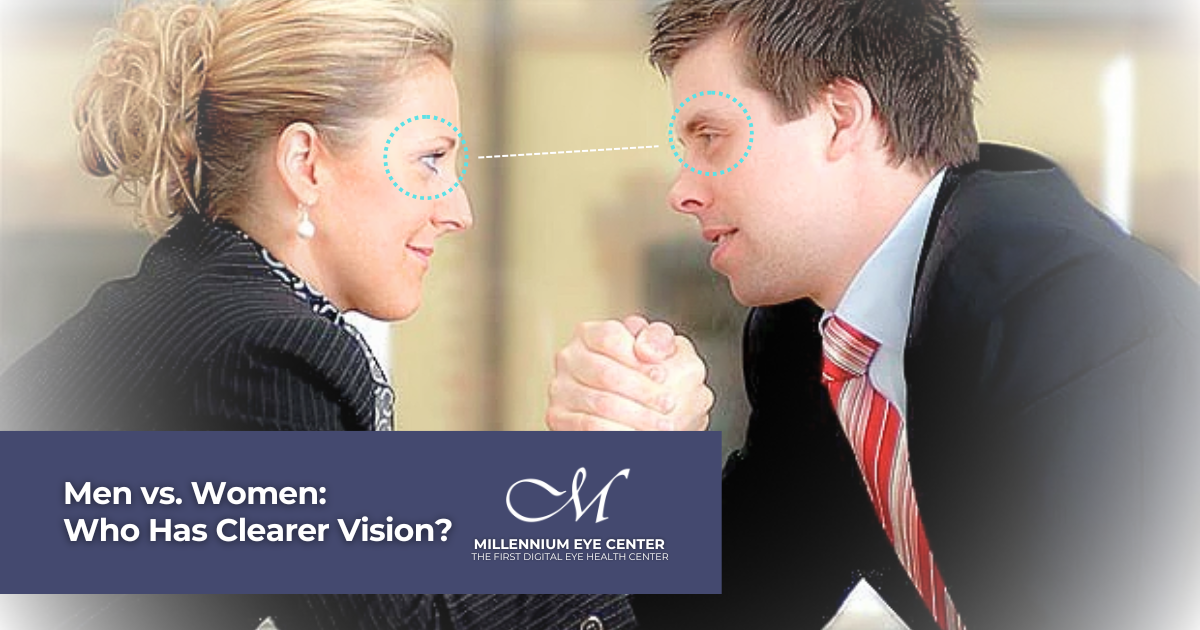At Millennium Eye Center, we believe in empowering you with accurate information about your vision.
Often, we encounter common misconceptions about eye health, and today, we’re setting the record straight, guided by the principles of Integrative Eye Care championed by our very own Dr. Lauretta Justin.
Myth 1: Women Have Worse Vision Than Men
Have you ever heard that women are more prone to vision problems than men? While some eye conditions might have a slightly higher prevalence in women, the notion of inherently “worse” vision is a significant oversimplification.
The Reality:
- Hormonal Influences: Fluctuations in hormones, particularly during pregnancy, menopause, and with the use of hormone replacement therapy, can sometimes lead to temporary vision changes like dry eyes. This doesn’t equate to overall “worse” vision.
- Autoimmune Conditions: Certain autoimmune diseases, which are more common in women, can have ocular manifestations (e.g., Sjögren’s syndrome leading to dry eye). However, these are specific conditions, not a blanket statement about female vision.
- Longevity: Women tend to live longer than men, and age-related eye conditions will naturally have a higher incidence in a larger and older population. This is a factor of lifespan, not an inherent weakness in female vision.
- Seeking Care: Studies suggest women are often more proactive in seeking healthcare, including eye exams. This may lead to earlier diagnosis of certain conditions, which could be misinterpreted as a higher prevalence.
Dr. Lauretta Justin’s Integrative Approach: Dr. Lauretta emphasizes a holistic understanding of these factors. Instead of focusing on broad generalizations, she considers individual hormonal profiles, potential underlying autoimmune issues, and lifestyle choices to provide personalized care for every patient, regardless of gender.
Myth 2: Vision Loss is a Normal Part of Aging
It’s a common refrain: “My vision is just getting worse because I’m getting older.” While some age-related changes are expected, significant vision loss should never be considered a normal or inevitable part of aging.
The Reality:
- Age-Related Changes vs. Disease: While the lens of the eye can naturally become less flexible with age (presbyopia, leading to difficulty with near vision), this is a physiological change, not vision loss. Conditions like macular degeneration, glaucoma, and cataracts are diseases that can lead to vision loss, but they are not an unavoidable consequence of aging.
- Preventive Measures Matter: Just like maintaining overall health, proactive steps can significantly impact your long-term vision. These include:
- Regular Comprehensive Eye Exams: Early detection is key to managing and treating many eye conditions.
- A Healthy Diet: Rich in antioxidants and omega-3 fatty acids, supporting overall eye health.
- UV Protection: Wearing sunglasses to shield your eyes from harmful sun rays.
- Managing Systemic Conditions: Conditions like diabetes and hypertension can impact vision, so proper management is crucial.
- Lifestyle Choices: Avoiding smoking is vital for eye health.
Dr. Justin’s Integrative Approach: Dr. Justin believes in empowering patients to take an active role in their eye health journey. Her integrative approach goes beyond simply treating symptoms. She emphasizes preventative strategies, nutritional guidance, and lifestyle modifications to support healthy aging of the eyes. By addressing the root causes and promoting overall well-being, we can challenge the notion that vision loss is an inevitable part of growing older.
The Takeaway:
Don’t let these myths cloud your understanding of your vision. At Millennium Eye Center, under the expert guidance of Dr. Lauretta Justin, we are committed to providing evidence-based, personalized, and integrative eye care for everyone. Schedule your comprehensive eye exam today and let us help you see clearly, at every stage of life. Your vision is precious – let’s protect it together.
Millennium Eye Center is a leading provider of comprehensive eye care in the Orlando area. Our experienced team of optometrists can help you manage your astigmatism and achieve optimal eye health.
Whether the best choice is glasses, contacts, or other treatment, we understand that the optimal vision correction solution is one that’s tailored to each individual patient. To schedule an appointment with our Eye Expert, Dr. Lauretta Justin, click HERE or text us at 407-292-9812.
[BOOK YOUR EYE EXAM HERE]
Thank you for choosing us as your family’s partners in lifelong vision health. We treasure the trust you place in our practice!
Top image used is a License-free image from Pixabay.
Disclaimer: The content on this blog is not intended to be a substitute for professional medical advice, diagnosis, or treatment. Always seek the advice of qualified health providers with questions you may have regarding medical conditions.

